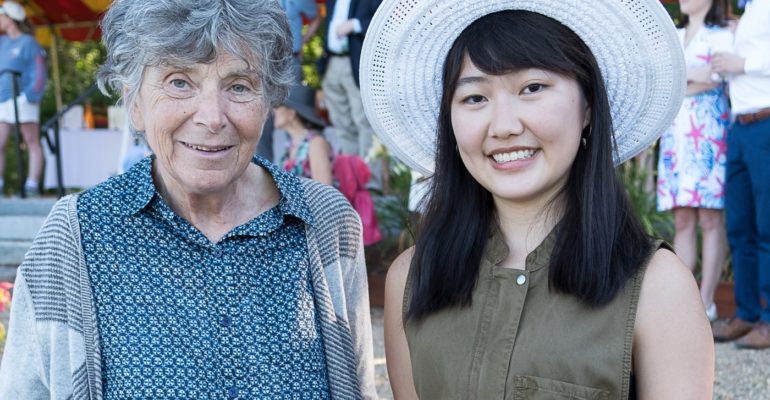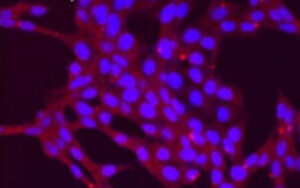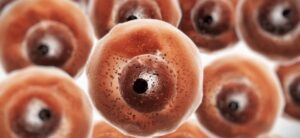Time flies when you’re having fun, or so they say, and three months at VIC have gone by in a flash. It’s hard to believe my time here has drawn to a close! In the time that I’ve been here, I’ve explored the beautiful city of Boston, gotten to know many excellent scientists at VIC, and carried out some fascinating work on wound healing. And yet there are still so many more things to do in Boston, so many interesting conversations that remain to be had, and so much more to do for my project – which has just now begun a new and exciting phase of investigation. But one’s research is never “finished”; the baton merely passes to someone else.
So how did a medical student from London end up in a lab on the other side of the Atlantic? It’s a bit of a long story, but VIC has ties to Imperial College London through Professor Mark Poznansky’s mother, Dr Dulcie Coleman. An eminent scientist herself, she has been Professor Emeritus at Imperial for many years; the Professor Dulcie Coleman Endowed Student Training Award, named in her honour, sponsors one Imperial student from the medical or biomedical sciences to carry out a research internship at VIC over three months in summer. It was thanks to this award and the support of both Professor Poznansky and Professor Coleman that I was able to come to VIC this year.
And what a summer it has been! I’m sure future students at VIC will have the same great experience that I did. When I first arrived, I was impressed by the smooth organisation, innovative ideas and incisive wit that seem to be the norm here. More than any other lab I’ve worked in, VIC runs like a well-oiled machine – due in no small part to the efforts of the senior administration and a dedicated lab manager. This is more important than just having a clean and tidy workspace for experiments (though that is certainly a plus); previously, I’ve had research held up for weeks because of missing reagents or faulty machines! But as I got more familiar with the team and the ongoing projects, what really stood out as the weeks went by was the level of scientific rigour. Work was never slipshod; all projects were meticulously planned and confidently executed. Such exacting standards are all the more important when one is pushing the frontiers of research. Here at VIC, I found research at the knife’s edge of technology: novel immunotherapies, innovative vaccines, and mind-boggling analyses of data in 40 dimensions.
As a student at VIC, I too had a hand in these exciting new developments. This summer I investigated the mechanisms of B cell immunotherapy for wound healing in the Sîrbulescu laboratory. I couldn’t have asked for a better mentor than Dr Sîrbulescu; careful and thorough, she really inspired me with her high standards in the lab as well as her astute project planning. It was just the right mix of guidance and independence – Dr Sîrbulescu was always happy to explain the finer details of the project and give direction to my work, but I also had a great deal of freedom in developing new hypotheses and thinking of new paths down which the project could go.
Mentorship is, I feel, something held in high regard at VIC. Despite the hectic buzz of work and the senior scientists’ busy schedules, there always seemed to be time for students to ask questions, get involved and be part of the team. VIC welcomes a fresh batch of student interns each summer and I appreciated how patiently the team dealt with the varying levels of knowledge and experience; our questions and suggestions were taken seriously, no matter how silly they might have appeared to be. Being a large lab with multiple research directions meant there were many people with different areas of expertise; from lymph node dissection to debugging R code, there would always be someone in the lab who I could turn to for help.
Indeed, the collaborative atmosphere was one of the best things about being at VIC. I really enjoyed the weekly lab meetings, where we would get updates on what other parts of the lab were doing with their research. These were also platforms for interesting and sometimes heated discussion, which I must admit I quite enjoyed being a spectator to! Outside of lab meetings, I often had fascinating conversations with other senior scientists and VIC members in the most random of places: in corridors, over lunch, in the lab at 8pm… These conversations are something I’ll miss now that I’m no longer at VIC; they were really useful for sparking new ideas and gaining entirely different perspectives on a problem. And while I’ll miss the conversations, I hope the friendships and ties I’ve made here will endure for years to come.
When I first wrote to Dr Poznansky and Professor Coleman about why I wanted to work at VIC, I said I wanted to “stand where research and clinical practice intersect”. A bold claim, and no doubt a difficult one to accomplish. But that is exactly the goal of VIC: to stand at that intersection, and to advance cures as quickly as possible. It’s truly been a privilege to have been here as part of VIC watching it happen before my eyes. Wishing all the very best to the VIC lab in all their future endeavours, and I’d love to be back again someday!
-Claire Chan





